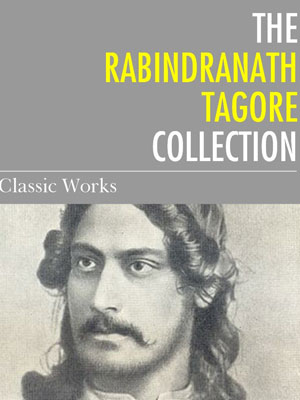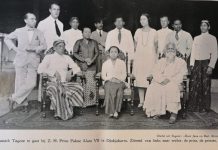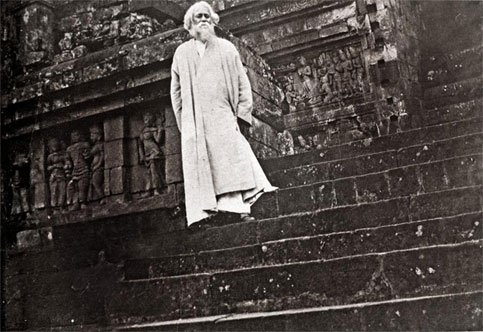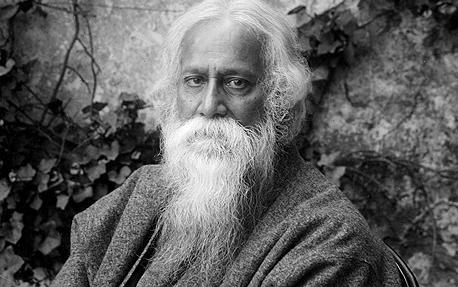41. Poem Anadrita Lekhani (Neglected Pen) of the book ‘Prahasini’ (Satirist) in Bengali, written by the Poet in 1937.
[Translator’s note: Human beings are by nature ungrateful, and so was Tagore. But, at least as an afterthought, he would repent much his failure to be grateful enough to people around him who helped him in his daily chores that enabled him to ride the crest of his literary fame much more smoothly than it wouldhave been otherwise. After the death of his wife he felt that he had never realized what a great support she had been to him during her lifetime and much regretted that. Similarly, his personal servant Banamali would much infuriate (as well as amuse) him by his off and on stupidity for which the Poet would chide him. But, I think, his poem ‘Puratan Vritya’ (Vintage Servant) is manifestation of his recompense to Banamali. Here the servant character ‘Kesta’, while on a pilgrimage with his master, himself got infection of small pox from his ailing master while nursing him and died and the master had to return home alone on much mortification. Obviously, in the poem below the ‘pen’ represents this neglected class who are no more cared for when their use is over. They do bear with this slight all their life, but they are also human beings. So at times they also do let their steam off as the ‘pen’ does here. But, the question is, how many of us realize our failure in gratitude, at least to our spouses let alone others, like the Poet? The readers of the poem should better ask themselves.]
The Editor’s pursuit hounds me every day,
Inspiration to write at heart“ nay
Neither in prose or poem
My mum mind averse to both of them.
In the Ashoka trees of the yore
The fair maids’ touch would bloom sure,
As we fancy, flowers marvelous
In age modern the Editor’s drive zealous
Drives the pen to bloom a stuff on the page“
Does it compare with the flowers of that age?
Humming songs I pass the days
Gazing at the winter field cozy (1) in sunrays
Light blue sky, the tepid breeze,
Unfold my fancy as it’ll please“
That float to form the clouds light
In my mind’s corner to its delight
The wayward thoughts lose configuration
There into the wayside aimless vegetation.
Now my pen left alone“
Had she been a poet ever,
Would narrate her desolation
As follows, in poesy clever.
O Poet, humbly my grievance I lodge,
Hoping you won’t try to dodge.
The pen that outlets your passion,
How she’ll bear exile to stagnation?
Dries up my heart“
Ink no more my thirst to quell
Now I’m only to cull dirt.
Why for me such a vain ordeal?
Did ever for self liberty I harp?
My beak ever got blunt or sharp?
Did ever by mishap or inadvertence
I blot ink or cause any such offence?
On paper I’ll shape up your diction
Nothing more is my expectation.
At your service blue throated I’ve been
My gullet bears caustic ink, as may be seen.
On your path of glory
I scribe on line after line,
About me none is wary
My name nowhere will shine.
Bhagirathi (2) earned his renown far and wide
But Gomukhi (2) is slighted as repute they will divide
As you sign, the paper’s ego will boil
I go thankless for my day’s toil.
Only in lying flat is his insolent pride,
While left to right is my ceaseless stride.
The paper carries your discourse and name,
Your motion pushes me minus any fame.
In unglorified service my physique will decay
To be thrown in waste basket one sad day.
On earth you are champion in chatter,
This letter is its mimic, pardon me Sir.
That’s all my complaint, so long
Yours obediently, to you I belong.
- The winter of Bengal is very cozy in contrast to that in Europe or America.
- As per Indian mythology, Bhagirath brought down the Ganges from heaven while on earth its source is Gomkhi in the Himalayas. But Gomukhi is much less eulogized in connection with the Ganges than Bhagirathi.
42. Poem: Garthikani (Anonym) of the book Prahasini (Satirist) written in 1938, 3 years before the Poet’s death.
[Translator’s note: The poem is a reply from the Poet, while he was in Kalimpong, to the letter from a girl who had written to him in poetry. Maitrayee Devi’s book Mangpute Rabindranath (i.e. Rabindranath at Mangpu, a hill station near Darjeeling which was her husband’s workplace, translated by Maitrayee Devi herself into English with the title “Tagore by Fireside”) gives translation of a few lines of this poemwhile she depicts the Poet’s vivacity even at his old age, when he was her guest at Mangpu, as follows – ]
“I despise that hapless wretch who grows decrepit
Just because of age.
So even if I am at my last breath
I tell you not about my falling strength.
The truth of these lines was known to all, who knew him personally. At the age of eighty, the Poet remained an image of youth- no physical weakness or disability or illness could touch his mind. During these days, when he was filling our home with such gay laughter and entertaining repartee, and was reading out to us hour after hour in the evenings, he was not keeping well physically. An illness was slowly spreading its roots inside him. He sometimes had fever, but didn’t care and if others expressed concern, he would resent it. He suffered but concealed his pain by an ever springing flow of poetry, a fountain of songs and merry laughter. That human existence can glow with such unbounded happiness and warmth, we would have never known, had we not seen him. The few days that we had the good fortune to be near him, we lived as life should be lived. Our youth would never have been so affluent, if we had not been near him. “Even if at my last breath, I tell you not of my failing strength!”“ the truth of this we experienced every day.”
High pitched and aimless your chatter
In this solitude my peace does shatter.
My onus, the Grandpa designate
On what plea do I negate?
You daring, in rhymes have written your letter,
Be paid in your own coin, that is better.
You knew well in your mind astute,
Prose would never my pride dilute.
The pen was a horse of mighty breed,
Though now aged, it limps a bit indeed.
There to you is my loss of face,
May I hide it and pass with grace.
Your pen trots lightly hence
Mine will pace in the same cadence-
Though breathless, yet I’ll not daunt
To keep it up lest my age you taunt.
Yet, in my heart is the apprehension
Of pride shattering Lord Madhusudan.(Lord Krishna)
One who feels old just for age
On that unfortunate is my rage.
So, even though my soul seeks exit,
Betrayal of fatigue I do not permit.
But what confuses me,
You take a poet always as silly!
They do disturb me, people various
In ways very diverse
That I endure them you’ve seen clearly
For that reason you keep wary,
You said so tenderly
Which I do note, not lightly.
Yet, I know, you know this,
Disturbances come in varieties.
With the poets the God has been kind,
So, the sweets the sisters bring I don’t mind.
Some compose sweet words flattering,
While some fetch milky sweets endearing.
In cuckoo voice some pitch an acrimony,
Some enchant just in musical harmony.
So, I think, if God out of sympathy,
Just to protect my tranquility
Would all these hassles free,
This parched life would a bigger torture be.
Let me explain with a simile“
The mountain there- the poles of electricity
Struck on its chest, emit light
More to prick human sight.
If the moon will so mortify,
To emit its bright fight shy,
Would it be a good plight,
Does mere heat always bring light?
That is my letter all about,
No, not as my vigor has run out
Only I am wiser“ it’s no fake“
Now realize, shelling words without brake-
Those may be widened with chatter,
May be flattened either.
Too much is with too little at par,
Rather than shout, better to whisper.
Unaware of this, the Bengalis miss
Both their price and lungs’ ease.
As outcome of their shouting mania
Bengal environs always with hysteria.
The unsaid itself is the art,
Mere chatter is that is overt.
Look here, your name latent,
Excels the price of fame’s patent.
But what a farce by Bharati -(Goddess of Learning/Art)
Chattering is not arty“
To explain it, I’ve already yielded an epic,
Will the Goddess of Art excuse this act heroic?
The truth needs confession,
The row that senility has caught Rabi (*) on“(* Rabindranath)
In protest thereof is this challenge thrown,
All the chatter from my mouth blown.
So I talk on, not a moment to spare,
This is like dying my hair“
The grey inside hidden
By the outward green(implying freshness)
In feeble voice so I battle,
Why juveniles alone tittle-tattle?
To a brat I’ll surrender not
That ego I still have a lot.
43. Poem from the book ‘Khapchara’ (Crazy) written to the Poet’s friend Rajsekhar Bose in 1937.
[Translator’s note: Rajsekhar Bose of Tagore’s time is still popular among the Bengali literati for his spoof literature which he wrote under the nickname Parasuram (a legendary sage of ancient India, notorious for his bad temper). The poet here upholds nonsense as a valuable part of human life as a design of God. In Hindu mythology Brahma is considered as the God of Creation, having four faces. In other words, man is of myriad character encompassing humor and frolic. In this poem the Poet gives a witty explanation of the four faces of Brahma.]
If you find this senile
Shedding his pretensions awhile-
Naughty seems to be,
Blabs successfully,
Notice his childish fruition
And lapses in dedication
Towards Vedas (*), not solemn(* 4000 year old scripture)
Like the Atlantic Ocean,
His words
Tend to farce
Brain crazy,
Mind borders lunacy,
And so you condemn
His education as vain“
Why the Creator, I’ll ask
Has four faces, for what task?
One for philosophy
To preach homily
The other for Veda accent,
That too well meant
The third is for poetry profuse
Our mind in emotion to muse
Then, the last one you must know“
Is the preserve for “Ho! Ho!”.(laughter)
Wild folly all fences to overflow
At its push
In my brain all nonsense ambush,
And spiral up to rigmarole
Without a goal.
A disciple of that four faced
I happen to be so has been said
However much that may amuse you
Support documents, not a few
Creation plays my fancy, you may see
Yet, I tilt for ramble with no less glee.
44. Prahasini [Translator’s note: The following poem is the preamble of the book Prahasini (Satirist) in Bengali by the Poet written in 1939, two years before his death at the age of 80..]
The laughing broom of the comet at times
Sweeps fun down the Universe to our climes
Speeding past the bewildered Sun’s dominion
With flashes of wit to lose into oblivion
Takes leave the Universal jester.
Along my life’s orbit, I know not why
The crazy comets at times do pass by.
Rushing in the void the tail of rigmarole
With momentary frolic without a goal
Shaking up the hood of the somber.
At times the world relaxes
Either in hilarity or amuses
Glitters laughter brilliant,
Yet not lasting, in an instant
Blots out its trail
The night in meditation on its dark seat
Scatters meteors in its freakish beat
Countless sparks of wit it does fling
That booty beyond reckoning“
Discharges in a few hours’ frail.
In this Universe there are matters crazy
Creator’s amused affection thereon I do fancy,
Mirth and frolic, God’s gift so
Inscribed in my dignity do go
At heart I know, it is precious
So much senile I shall be never
To call caddish fun and laughter
If so the old will grunt
With God I’ll merrily share its brunt
Grant it forthwith and not turn serious.






